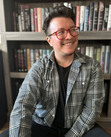Gabe Cole Novoa's Blog, page 60
June 8, 2015
Discussion: What Are You Working On?
 Photo credit: miel.books on FlickrSo I’ve been having a busy summer so far.
Photo credit: miel.books on FlickrSo I’ve been having a busy summer so far.Shortly after finishing school, I dove into #NerdyWIP revisions, which I’ve tweeted about quite a bit. It involved quite a few large changes, and moving scenes around, and deleting stuff, and adding a ton of things here and there, and also more kissing (because who doesn’t love more kissing?).
Once that was bounced back to the amazing agent, it was time for research reading for the #YAFantasyWIP, which I’ve also tweeted about. Research reading took about a week, and now I’m back revising again. With more really large changes to make.
Neither of those WIPs were early drafts, but I’m still finding that the braver I get with these revisions and the more I’m willing to make really big changes, the more I love the way it turns out. I’ve deleted scenes (and kept copies of course) and completely changed character relationships and world building and every change makes each book a little better.
Watching a WIP develop into something better, something even bigger than I first imagined when I began writing is my favorite part. Because creating something from nothing is really freaking awesome, but taking that something and making it an amazing something just never ever gets old.
Once I finally finish this round of revision, I’ll be looking for (very specific) betas, revising again, then sending it off to my agent.
And then I have another first draft all ready for revisions that I’m equally excited about. Plus Beyond the Red stuff and work editing and anything else that comes in this summer.
It feels kind of like juggling, except I focus on each project completely when I catch it, so to speak. But it’s been really fun to always have something to be excited to work on.
So now let’s open up discussion: what have you guys been working on?
Twitter-sized bite:
What writing stuff have you been working on this summer? Join the discussion on @Ava_Jae's blog. (Click to tweet)





Published on June 08, 2015 04:00
June 6, 2015
Queer YA Scrabble Blogathon Giveaway: Team Unicorn
Today is the day! Welcome to Team Unicorn's Queer YA Scrabble Blogathon stop! I'm so excited to introduce you to the awesome team and their incredible books!
First! A quick rundown of how this thing works.
Team Unicorn is one of FIVE times, and each of us has a post just like this one featuring our fantabulous team. Within these posts are super sneakily hidden letters that are part of an anagram. Every team has their own anagram, and your job, as you super smart sleuths, is to track down the letters and solve each anagram. Once you've solved a team's anagram you can go to the team page and enter the giveaway for that team's box of signed wonderfulness. YAY!
Anagram hint: Here on Writability, you should maybe look out for the pretty rainbow colors. Just saying. ;)
But what if you enter and don't win, you ask? All hope is not lost! Starting tomorrow is the auction that will run until the 15th (giveaway winners will be announced on the 9th), where you will have another chance to win the exact same box of prizes plus wildcard critiques from agents and editors.
Team Unicorn's wildcard prizes are:
1 Query critique from Ms. Maria Vincete at P.S. Literary1 Twitter pitch critique from Ms. Laura Zats of Red Sofa Literary1 Five page critique from Mr. Stephen Morgan at Entangled Publishing1 "Skip the Query Line" from Ms. Saba Sulaiman at Talcott Notch
Also, there's maybe a bonus giveaway at the bottom of this post. :)
Explanations aside, I'm delighted to introduce you to Team Unicorn! I've asked them each a couple questions, so enjoy!
 Photo credit: Goodreads
Photo credit: Goodreads
Becky Albertalli— Simon vs the Homo Sapiens Agenda
What inspired you to write your book?
I struggle with this question, because it truly feels like Simon just popped into my head, demanding to be written about! I have a hard time pinpointing one specific source of inspiration, but I think an important part of my process was my work as a psychologist with LGBT and gender nonconforming teens and children.
It’s been fantastic seeing more and more representation of the full sexuality and gender spectrums. What was the hardest part about writing your novel?
As a non-marginalized author writing about a character from a marginalized group, my process required a tremendous amount of care, research, and openness to feedback. I think a part of me will always worry about the potential for harm, even after receiving positive feedback from members of the gay community throughout the publication process. Readers still might choose not to read my book because I’m not a gay author, which I completely understand and respect. On the flip side, I’ve been asked why I chose to make Simon white and cisgender, which is an amazing question! It can be a really tricky balance determining which stories I think I can share authentically. I’m absolutely going to fall short sometimes, which can be really hard to accept. It helps when I find myself in a position to support LGBTQIA + causes or boost marginalized authors, both of which I try to do regularly.
 Photo credit: Goodreads
Photo credit: Goodreads
Suki Fleet— This is Not a Love Story
What inspired you to write your book?
My initial shockblast of inspiration came from seeing a homeless kid crying in an alley near where I live. Although I started writing This is Not a Love Story years later, ultimately, I wrote this book for him. I wanted to write a happy ending for kids who don't always get them. Homelessness (especially teen homelessness) is an issue very close to my heart.
It’s been fantastic seeing more and more representation of the full sexuality and gender spectrums. What was the hardest part about writing your novel?
Writing a novel is crazily hard :) I'm drawn to writing the stories that don't often get written, and I enjoy bringing to life very diverse characters--characters that hopefully readers can identify with whatever their gender/sexuality/age or status in life.
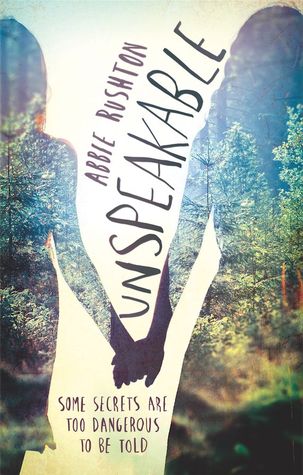 Photo credit: Goodreads
Photo credit: Goodreads
Abbie Rushton— Unspeakable
What inspired you to write your book?
Lots of things! Firstly, I wanted to write a book for teens that included a gay relationship, as I thought homosexual teens were really under-represented in YA fiction. I didn't want it to be an 'issue' or 'coming out' book, though, so I paired it with another idea I'd had, which just started with a simple question: What if (the best kind of writer question!) you had a secret so powerful it stole your voice?
The setting of Unspeakable was really important to me. Like me, my character Megan adores being outside, and I live fairly close to the New Forest, which struck me as a unique and beautiful place to set a story. In fact, I love the New Forest so much, I got married there last year, in the same village I used for inspiration for the book!
It’s been fantastic seeing more and more representation of the full sexuality and gender spectrums. What was the hardest part about writing your novel?
The hardest part for me was worrying that I somehow wasn't qualified to write about a same-sex relationship because I hadn’t experienced one myself. But it was such an important story to tell, and I reasoned that I had experience of falling in love, so why shouldn't I tell it?
I've had some lovely messages from teens who've said that Megan and Jasmine's relationship made them feel 'normal for a change'. So I hope I've pulled it off!
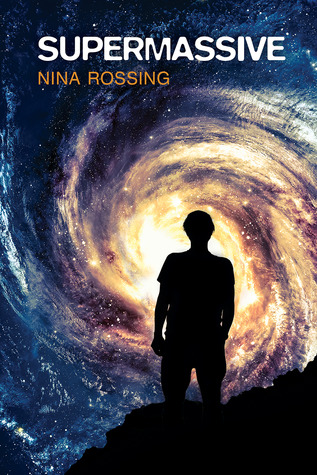 Photo credit: GoodreadsNina Rossing—
Supermassive
Photo credit: GoodreadsNina Rossing—
Supermassive
What inspired you to write your book?
To make a long story short: In my job as a high school teacher, I experienced how difficult it was for LGBT students to be open and how few novels there were out there that could give them a sense of self, and of not being alone. Since I had always harbored this dream of being a writer one day, I finally got started on a novel that naturally turned out to be LGBT themed. Also, in my first teaching job I worked in a pretty remote area where being different can feel extra problematic, so years later when I started writing Supermassive, I added the same kind of setting to the plot. Though I am a city girl, I have a fondness for remote areas - my next novel is also an LGBT story set far away from urban areas!
It’s been fantastic seeing more and more representation of the full sexuality and gender spectrums. What was the hardest part about writing your novel?
I did a lot of thinking about how to best present the LGBT side of the story. When I started writing Supermassive, I used neutral gender terms, for example ‘grandchild’ instead of ‘grandson’, a neutral first name, and I never focused on specifics about the protagonist’s looks or clothes. I knew he was a boy, and as the story progressed I made it clearer to the readers too, gradually inserting more clues. In the end, I decided to insert more evidence of his gender, but I did struggle a bit with finding the right balance here. (When it got published, the blurb made it clear he was a boy, though.)
I wanted my story to be a universal love story where gender or sexuality was not the main issue, but where those aspects still were important to the plot. The book is more about coming to terms with grief and loss, and how to approach your feelings for someone, than it is a story about sexuality. The protagonist knows he’s gay and though he’s not openly out, his sexuality is mostly unproblematic to him. His main concern is first and foremost whether or not his feelings will be reciprocated by the boy he loves so fiercely. When I wrote the book, then, I always made sure those aspects of life that are recognizable regardless of gender or sexual orientation, came first. I experienced a few moments of doubt as I wrote the story, because I sometimes worried that readers would think I ignored the LGBT issue and that I didn’t give it enough space. There is a coming out aspect in the story though, and in the end I think I reached a good balance between the themes.
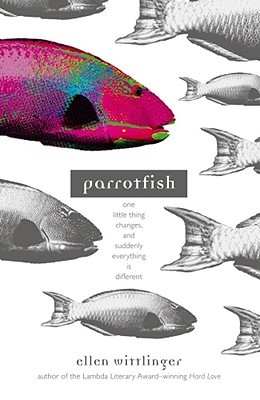 Photo credit: Goodreads
Photo credit: Goodreads
Ellen Wittlinger— Parrotfish
What inspired you to write your book?
I lived for several years in Provincetown, Massachusetts which has always been a very GLBT-friendly place. Although I’m straight, I identified with my gay and lesbian friends in P’town who were often estranged from their parents, as I was also. When I began to write novels for teenagers I wanted to include gay and lesbian characters, not only so GLBT teens had someone to identify with, but also so my straight readers would begin to identify with gay and lesbian characters and through that process see what they all had in common.
I didn’t feel I understood what it meant to be transgender well enough to write about it until I met my daughter’s friend, Toby, who is FTM. It turned out that Toby was a big fan of my earlier books, so when I asked if he’d help me write a transgender character, he was thrilled. I did a lot of reading before I began to interview Toby; I didn’t want my questions to be either stupid or offensive. Toby sat with me for a long afternoon and answered everything. He told me many stories about what it felt like growing up transgender, a few of which I used in the book. And once the book was finished, Toby read and vetted it for me. He’s the angel of Parrotfish.
It’s been fantastic seeing more and more representation of the full sexuality and gender spectrums. What was the hardest part about writing your novel?
This book was actually a joy to write. It always takes a little while to get your main character’s voice right, but Grady came to me pretty quickly. I loved his humor and gentleness. The only difficulty was my fear of getting something wrong, but that was alleviated by knowing that Toby had my back.
----------------
By the way, Parrotfish will soon be available in a new edition which updates some of the language used and all of the resources at the end of the book. I’m happy that the book will remain relevant to a new generation of teenagers.
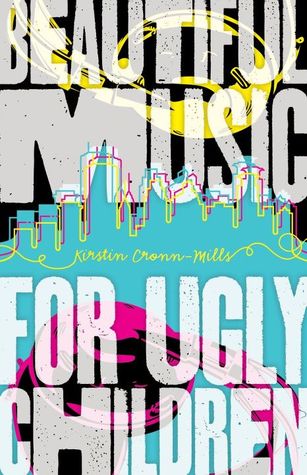 Photo credit: Goodreads
Photo credit: Goodreads
Kirstin Cronn-Mills— Beautiful Music for Ugly Children What inspired you to write your book?
The inspiration for the book was a mashup of the two worlds I live in: writing and teaching. I was just beginning the book, and I knew I wanted to write about radio and music, two things I love. And I knew I wanted to write about a guy who hid behind his radio show while he tried out his identity on the air--no big deal, just the usual teenage who-am-I? stuff. At the same time I started the book, I was prepping to teach a diversity literature class at my college. I knew I wanted to include something that was LGBTQ, and I stumbled across a book called The Phallus Palace, by Dean Kotula. That book is an exploration of many elements of being/becoming a trans man (at the time, Kotula's term was "female-to-male transsexual"). There were very short autobiographies of trans men in the book, and they complete captured me. I remember thinking, "These men are being themselves at enormous costs," and I was intrigued, inspired, and very awed. Those short autobiographies collided in my head with my character, and suddenly Gabe was a trans man, hiding behind his radio show and figuring out how to be a guy as well as how to be a human being in the world. Then, of course, I had to figure out how to write a trans man character (and that took years of research and learning!). Because he and I are both music geeks, I started there and built slowly.
It’s been fantastic seeing more and more representation of the full sexuality and gender spectrums. What was the hardest part about writing your novel?
The hardest thing was making sure I had Gabe's transition in the realm of possibility. How would a young trans man go about his transition? What would he do, what would he think about doing, what would he have or not have? It took me years of listening, learning, and thinking to get that part accomplished. In terms of his gender expression, he sees himself as just a guy, so to write him I had to slip into a teenage guy mentality (which isn't very hard for me : ) ). I could just consult with the teenage guys I know. Same thing with his sexuality--Gabe considers himself a straight guy, so his sexuality also wasn't difficult. One of the biggest challenges was to figure out what he would call his penis, even though he doesn't have one. After consultation with various guys, we settled on "imaginary dick." I also had to figure out whether or not he'd have a prosthetic (he does). Gabe's a pretty binary guy, by design. I didn't feel comfortable taking on a more gender variant version of him (in my next book, there are more gender flexible characters).
Also, don't forget to check out Team Phoenix, Team Hydra, Team Dragon and Team Griffin for more amazing prizes!
Did you get all of the letters (hint: you should have fifteen)? Awesome! Now solve the anagram, head over to Team Unicorn's entry page and enter! And as a bonus I've got an extra giveaway right here! Without any anagramming, you have until Monday, June 8th at 11:59 PM EST to enter to win a paperback copy Suki Fleet's newest, The Glass House .
Good luck!
a Rafflecopter giveaway





First! A quick rundown of how this thing works.
Team Unicorn is one of FIVE times, and each of us has a post just like this one featuring our fantabulous team. Within these posts are super sneakily hidden letters that are part of an anagram. Every team has their own anagram, and your job, as you super smart sleuths, is to track down the letters and solve each anagram. Once you've solved a team's anagram you can go to the team page and enter the giveaway for that team's box of signed wonderfulness. YAY!
Anagram hint: Here on Writability, you should maybe look out for the pretty rainbow colors. Just saying. ;)
But what if you enter and don't win, you ask? All hope is not lost! Starting tomorrow is the auction that will run until the 15th (giveaway winners will be announced on the 9th), where you will have another chance to win the exact same box of prizes plus wildcard critiques from agents and editors.
Team Unicorn's wildcard prizes are:
1 Query critique from Ms. Maria Vincete at P.S. Literary1 Twitter pitch critique from Ms. Laura Zats of Red Sofa Literary1 Five page critique from Mr. Stephen Morgan at Entangled Publishing1 "Skip the Query Line" from Ms. Saba Sulaiman at Talcott Notch
Also, there's maybe a bonus giveaway at the bottom of this post. :)
Explanations aside, I'm delighted to introduce you to Team Unicorn! I've asked them each a couple questions, so enjoy!
 Photo credit: Goodreads
Photo credit: GoodreadsBecky Albertalli— Simon vs the Homo Sapiens Agenda
What inspired you to write your book?
I struggle with this question, because it truly feels like Simon just popped into my head, demanding to be written about! I have a hard time pinpointing one specific source of inspiration, but I think an important part of my process was my work as a psychologist with LGBT and gender nonconforming teens and children.
It’s been fantastic seeing more and more representation of the full sexuality and gender spectrums. What was the hardest part about writing your novel?
As a non-marginalized author writing about a character from a marginalized group, my process required a tremendous amount of care, research, and openness to feedback. I think a part of me will always worry about the potential for harm, even after receiving positive feedback from members of the gay community throughout the publication process. Readers still might choose not to read my book because I’m not a gay author, which I completely understand and respect. On the flip side, I’ve been asked why I chose to make Simon white and cisgender, which is an amazing question! It can be a really tricky balance determining which stories I think I can share authentically. I’m absolutely going to fall short sometimes, which can be really hard to accept. It helps when I find myself in a position to support LGBTQIA + causes or boost marginalized authors, both of which I try to do regularly.
 Photo credit: Goodreads
Photo credit: GoodreadsSuki Fleet— This is Not a Love Story
What inspired you to write your book?
My initial shockblast of inspiration came from seeing a homeless kid crying in an alley near where I live. Although I started writing This is Not a Love Story years later, ultimately, I wrote this book for him. I wanted to write a happy ending for kids who don't always get them. Homelessness (especially teen homelessness) is an issue very close to my heart.
It’s been fantastic seeing more and more representation of the full sexuality and gender spectrums. What was the hardest part about writing your novel?
Writing a novel is crazily hard :) I'm drawn to writing the stories that don't often get written, and I enjoy bringing to life very diverse characters--characters that hopefully readers can identify with whatever their gender/sexuality/age or status in life.
 Photo credit: Goodreads
Photo credit: GoodreadsAbbie Rushton— Unspeakable
What inspired you to write your book?
Lots of things! Firstly, I wanted to write a book for teens that included a gay relationship, as I thought homosexual teens were really under-represented in YA fiction. I didn't want it to be an 'issue' or 'coming out' book, though, so I paired it with another idea I'd had, which just started with a simple question: What if (the best kind of writer question!) you had a secret so powerful it stole your voice?
The setting of Unspeakable was really important to me. Like me, my character Megan adores being outside, and I live fairly close to the New Forest, which struck me as a unique and beautiful place to set a story. In fact, I love the New Forest so much, I got married there last year, in the same village I used for inspiration for the book!
It’s been fantastic seeing more and more representation of the full sexuality and gender spectrums. What was the hardest part about writing your novel?
The hardest part for me was worrying that I somehow wasn't qualified to write about a same-sex relationship because I hadn’t experienced one myself. But it was such an important story to tell, and I reasoned that I had experience of falling in love, so why shouldn't I tell it?
I've had some lovely messages from teens who've said that Megan and Jasmine's relationship made them feel 'normal for a change'. So I hope I've pulled it off!
 Photo credit: GoodreadsNina Rossing—
Supermassive
Photo credit: GoodreadsNina Rossing—
Supermassive
What inspired you to write your book?
To make a long story short: In my job as a high school teacher, I experienced how difficult it was for LGBT students to be open and how few novels there were out there that could give them a sense of self, and of not being alone. Since I had always harbored this dream of being a writer one day, I finally got started on a novel that naturally turned out to be LGBT themed. Also, in my first teaching job I worked in a pretty remote area where being different can feel extra problematic, so years later when I started writing Supermassive, I added the same kind of setting to the plot. Though I am a city girl, I have a fondness for remote areas - my next novel is also an LGBT story set far away from urban areas!
It’s been fantastic seeing more and more representation of the full sexuality and gender spectrums. What was the hardest part about writing your novel?
I did a lot of thinking about how to best present the LGBT side of the story. When I started writing Supermassive, I used neutral gender terms, for example ‘grandchild’ instead of ‘grandson’, a neutral first name, and I never focused on specifics about the protagonist’s looks or clothes. I knew he was a boy, and as the story progressed I made it clearer to the readers too, gradually inserting more clues. In the end, I decided to insert more evidence of his gender, but I did struggle a bit with finding the right balance here. (When it got published, the blurb made it clear he was a boy, though.)
I wanted my story to be a universal love story where gender or sexuality was not the main issue, but where those aspects still were important to the plot. The book is more about coming to terms with grief and loss, and how to approach your feelings for someone, than it is a story about sexuality. The protagonist knows he’s gay and though he’s not openly out, his sexuality is mostly unproblematic to him. His main concern is first and foremost whether or not his feelings will be reciprocated by the boy he loves so fiercely. When I wrote the book, then, I always made sure those aspects of life that are recognizable regardless of gender or sexual orientation, came first. I experienced a few moments of doubt as I wrote the story, because I sometimes worried that readers would think I ignored the LGBT issue and that I didn’t give it enough space. There is a coming out aspect in the story though, and in the end I think I reached a good balance between the themes.
 Photo credit: Goodreads
Photo credit: GoodreadsEllen Wittlinger— Parrotfish
What inspired you to write your book?
I lived for several years in Provincetown, Massachusetts which has always been a very GLBT-friendly place. Although I’m straight, I identified with my gay and lesbian friends in P’town who were often estranged from their parents, as I was also. When I began to write novels for teenagers I wanted to include gay and lesbian characters, not only so GLBT teens had someone to identify with, but also so my straight readers would begin to identify with gay and lesbian characters and through that process see what they all had in common.
I didn’t feel I understood what it meant to be transgender well enough to write about it until I met my daughter’s friend, Toby, who is FTM. It turned out that Toby was a big fan of my earlier books, so when I asked if he’d help me write a transgender character, he was thrilled. I did a lot of reading before I began to interview Toby; I didn’t want my questions to be either stupid or offensive. Toby sat with me for a long afternoon and answered everything. He told me many stories about what it felt like growing up transgender, a few of which I used in the book. And once the book was finished, Toby read and vetted it for me. He’s the angel of Parrotfish.
It’s been fantastic seeing more and more representation of the full sexuality and gender spectrums. What was the hardest part about writing your novel?
This book was actually a joy to write. It always takes a little while to get your main character’s voice right, but Grady came to me pretty quickly. I loved his humor and gentleness. The only difficulty was my fear of getting something wrong, but that was alleviated by knowing that Toby had my back.
----------------
By the way, Parrotfish will soon be available in a new edition which updates some of the language used and all of the resources at the end of the book. I’m happy that the book will remain relevant to a new generation of teenagers.
 Photo credit: Goodreads
Photo credit: GoodreadsKirstin Cronn-Mills— Beautiful Music for Ugly Children What inspired you to write your book?
The inspiration for the book was a mashup of the two worlds I live in: writing and teaching. I was just beginning the book, and I knew I wanted to write about radio and music, two things I love. And I knew I wanted to write about a guy who hid behind his radio show while he tried out his identity on the air--no big deal, just the usual teenage who-am-I? stuff. At the same time I started the book, I was prepping to teach a diversity literature class at my college. I knew I wanted to include something that was LGBTQ, and I stumbled across a book called The Phallus Palace, by Dean Kotula. That book is an exploration of many elements of being/becoming a trans man (at the time, Kotula's term was "female-to-male transsexual"). There were very short autobiographies of trans men in the book, and they complete captured me. I remember thinking, "These men are being themselves at enormous costs," and I was intrigued, inspired, and very awed. Those short autobiographies collided in my head with my character, and suddenly Gabe was a trans man, hiding behind his radio show and figuring out how to be a guy as well as how to be a human being in the world. Then, of course, I had to figure out how to write a trans man character (and that took years of research and learning!). Because he and I are both music geeks, I started there and built slowly.
It’s been fantastic seeing more and more representation of the full sexuality and gender spectrums. What was the hardest part about writing your novel?
The hardest thing was making sure I had Gabe's transition in the realm of possibility. How would a young trans man go about his transition? What would he do, what would he think about doing, what would he have or not have? It took me years of listening, learning, and thinking to get that part accomplished. In terms of his gender expression, he sees himself as just a guy, so to write him I had to slip into a teenage guy mentality (which isn't very hard for me : ) ). I could just consult with the teenage guys I know. Same thing with his sexuality--Gabe considers himself a straight guy, so his sexuality also wasn't difficult. One of the biggest challenges was to figure out what he would call his penis, even though he doesn't have one. After consultation with various guys, we settled on "imaginary dick." I also had to figure out whether or not he'd have a prosthetic (he does). Gabe's a pretty binary guy, by design. I didn't feel comfortable taking on a more gender variant version of him (in my next book, there are more gender flexible characters).
Also, don't forget to check out Team Phoenix, Team Hydra, Team Dragon and Team Griffin for more amazing prizes!
Did you get all of the letters (hint: you should have fifteen)? Awesome! Now solve the anagram, head over to Team Unicorn's entry page and enter! And as a bonus I've got an extra giveaway right here! Without any anagramming, you have until Monday, June 8th at 11:59 PM EST to enter to win a paperback copy Suki Fleet's newest, The Glass House .
Good luck!
a Rafflecopter giveaway





Published on June 06, 2015 09:00
June 5, 2015
Queer YA Scrabble Intro Post!
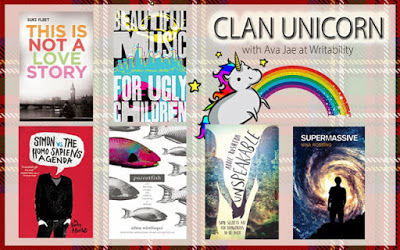 Boy, do I have an exciting weekend planned for you guys! Those of you who follow me on Twitter my have already heard that I’m hosting one of the stops for Queer YA Scrabble along with Gay YA, Afterwritten, YA Interrobang, Queer YA and LGBT YA Reviews! And those who didn’t know…surprise! I think you guys will like this.
Boy, do I have an exciting weekend planned for you guys! Those of you who follow me on Twitter my have already heard that I’m hosting one of the stops for Queer YA Scrabble along with Gay YA, Afterwritten, YA Interrobang, Queer YA and LGBT YA Reviews! And those who didn’t know…surprise! I think you guys will like this.So what is Queer YA Scrabble? you ask. It’s an event running from June 6th-8th to support
Stonewall-UK and increase awareness of QUILTBAG YA books. Starting tomorrow, anyone interested in participating will hunt for letters hidden in super sneaky blog posts featuring the books and then you guys will solve an anagram to compete for a chance to win a box stuffed full of really awesome QUILTBAG YA books. Yay!
After the giveaway, there will be an auction for another set of the book-boxes along with critiques and what not donated by super awesome agents and editors. 100% of the proceeds will be donated to Stonewall.
So here on Writability, I’ll have a special post up on June 7th with mini-interviews from Becky Albertalli ( Simon vs. the Homo Sapiens Agenda ), Suki Fleet ( This is Not a Love Story ), Abbie Rushton ( Unspeakable ), Nina Rossing ( Supermassive ), Ellen Wittlinger ( Parrotfish ) and Kirstin Cronn-Mills ( Beautiful Music for Ugly Children ) with the hidden anagram letters.
I’m really excited to be a part of this, and I hope you guys love it! See you all on the 7th. :)
UPDATE: Team Unicorn's anagram is hard, so I've decided to post early! Come back at noon TODAY (June 6th) to start the letter hunt! :)
Twitter-sized bite:
Writability is a stop in the Queer YA Scrabble giveaway! Will you be joining in the fun? (Click to tweet)





Published on June 05, 2015 04:00
June 3, 2015
You Don’t Have to Get it Right the First Time
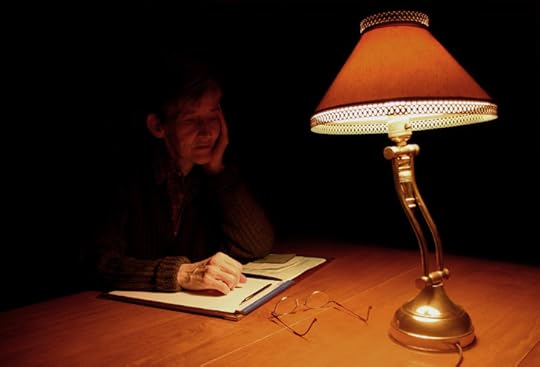 Photo credit: re_birfConfession: sometimes, when one of my cross-posted onto tumblr posts explodes, I like to cruise through the comments and tags. It’s a fun and quick way to see what people think about the posts and the feedback has often been pretty thought-provoking.
Photo credit: re_birfConfession: sometimes, when one of my cross-posted onto tumblr posts explodes, I like to cruise through the comments and tags. It’s a fun and quick way to see what people think about the posts and the feedback has often been pretty thought-provoking.The posts that get tumblr-happy are often craft posts. And the comments and tags, I’ve noticed, often include writers stressing out about trying to nail all of the writing tidbit dos and don’ts while drafting.
Except here’s the thing: with the exception of writing tips specifically geared for first drafting, most are not meant to be tackled while first drafting.
To clarify:
Things you should be focusing on while first drafting:
Getting the story written.See #1
Things you don’t need to worry about while first drafting:
Getting your opening right.Getting your middle right. Getting your ending right. Getting your characters right.Getting the worldbuilding right.Getting the sentence-level writing right. Getting the pacing right.Getting anything perfect the first time.
The truth is, the first draft is for you, the author. It’s about getting the story out and creating the clay that you can later shape into an awesome book. It’s about getting a feel for the story and the characters and working out the progression of the plot. It’s about putting down some words so that you have something to revise later.
It’s not about getting anything right the first time.
I’ve been finding, as of late, the more I learn about the revisions, the more I’ve gotten comfortable with making huge changes. And the more I’ve gotten comfortable with making huge changes, the more I’ve loved the end result. And the more I’ve loved the end result after making tons of changes and doing revision round after revision round, the more I’ve realized that old adage “writing is rewriting” is painfully true.
But it also takes a ton of pressure off the first draft. Because your sentences can suck and your pacing can be messed up and your plot can be messy and your characters can be not quite right and it’s okay. It’s all okay. It’s okay if you have blanks and cities and characters with no names or personalities. It’s okay if your book sags in the middle and if you use a terrible, clichéd prologue. You do whatever you need to do to get that story down and don’t worry for one second about making it right while first drafting.
Take the pressure off when you’re first drafting. Don’t worry about the work to come.
Just get the story written.
What do you think? Is getting the story right the first time important?
Twitter-sized bites:
"The truth is, the first draft is for you, the author." (Click to tweet)
Writer @Ava_Jae says the first draft is "not about getting anything right the first time." What do you think? (Click to tweet)





Published on June 03, 2015 04:00
June 2, 2015
Vlog: Elements of a Great Book Ending
You guys asked, I answered: here are some tips on writing a great book ending. And also a spiel about why they terrify me. (Spoiler: endings are hard.)
Also! The quote! I have found it:
What Makes a Great Final Sentence?How to Write Effective Endings
What tips do you have for writing a great book ending? What elements do some of your favorite endings have?
Twitter-sized bites:





Also! The quote! I have found it:
"Your first chapter sells your book. Your last chapter sells your next book."—Mickey Spillane (from Plot & Structure by James Scott Bell, which is a fantastic writing craft book, by the way).RELATED LINKS:
What Makes a Great Final Sentence?How to Write Effective Endings
What tips do you have for writing a great book ending? What elements do some of your favorite endings have?
Twitter-sized bites:
Struggling to figure out how to end your WIP? Writer @Ava_Jae vlogs some book ending tips. (Click to tweet)
What goes into a great book ending? Writer @Ava_Jae vlogs essential elements to a powerful finale. (Click to tweet)





Published on June 02, 2015 06:29
June 1, 2015
Book Review: BLACK IRIS by Leah Raeder
 Photo credit: GoodreadsSo about partway through my reading of Leah Raeder’s
Black Iris
, I knew I was going to have to review it, but it quickly became apparent it was going to be a tougher book to review. Not because I didn’t like it, but because it was so different from anything I’d read in a long time and just felt important, somehow. Like this was an important book for me to be reading. It’s hard to explain.
Photo credit: GoodreadsSo about partway through my reading of Leah Raeder’s
Black Iris
, I knew I was going to have to review it, but it quickly became apparent it was going to be a tougher book to review. Not because I didn’t like it, but because it was so different from anything I’d read in a long time and just felt important, somehow. Like this was an important book for me to be reading. It’s hard to explain.Before I go on, here’s the summary from Goodreads:
“It only took one moment of weakness for Laney Keating’s world to fall apart. One stupid gesture for a hopeless crush. Then the rumors began. Slut, they called her. Queer. Psycho. Mentally ill, messed up, so messed up even her own mother decided she wasn't worth sticking around for.
If Laney could erase that whole year, she would. College is her chance to start with a clean slate.
She's not looking for new friends, but they find her: charming, handsome Armin, the only guy patient enough to work through her thorny defenses—and fiery, filterless Blythe, the bad girl and partner in crime who has thorns of her own.
But Laney knows nothing good ever lasts. When a ghost from her past resurfaces—the bully who broke her down completely—she decides it's time to live up to her own legend. And Armin and Blythe are going to help.
Which was the plan all along.
Because the rumors are true. Every single one. And Laney is going to show them just how true.
She's going to show them all.”
So first and foremost, Black Iris is a New Adult novel, but holy guacamole it is so very different from 99% of NA novels out there right now. Black Iris is not a contemporary romance—it’s a dark, unsettling Thriller with deeply twisted characters and tons of twists. It’s the kind of book I feel like I’ll need to re-read to fully absorb, because it isn’t until all the pieces fall together that it really all begins to make sense.
Like Unteachable , Raeder expertly weaves a raw, realistic voice with moments of beauty and clarity. The characters are flawed and make few attempts to be likable—and there were some moments where I almost felt like Laney, the protagonist, was getting a little heavy-handed on deliberately portraying herself as unlikable (not so much through actions, but through things she would say about being an unlikable heroine). That said, I liked that many of the characters weren’t trying to be likable—they made ugly decisions, and had terrible thoughts, and they owned them completely.
The only other thing that occasionally threw me off was the timeline. The story is told non-chronologically with chapters jumping back and forth between the present and past, which occasionally got a little confusing (one of the reasons, I suspect, I felt like I would benefit from a second read).
Despite that, I really loved this book. From the gripping plot, to the out-there-for-you-to-see ugly emotions, to a protagonist who wasn’t completely sure about her sexual identity (and wasn’t trying to be sure or put a label on it), to a cast of characters who were twisted, and layered, and all-around fascinating, Black Iris is on my list of favorites.
If you’re looking for a gripping, beautifully-written, dark, and complicated New Adult Thriller, I couldn’t recommend this one more. 4.5/5 stars to this seriously awesome book.
Diversity note: The protagonist doesn’t label herself, but is attracted to (and has on-the-page explicit relationships with) both men and women, and she also has borderline personality disorder. Other major characters are bipolar and have antisocial personality disorder, and two major characters are Persian (including one love interest).
Have you read Black Iris?
Twitter-sized bites:
.@Ava_Jae gives 4.5/5 stars to BLACK IRIS by @LeahRaeder. Have you read this twisted, raw NA Thriller? (Click to tweet)
Looking for a dark, layered, and diverse NA Thriller? Check out BLACK IRIS by Leah Raeder. (Click to tweet)





Published on June 01, 2015 04:00
May 29, 2015
On the Romanticization of Writers
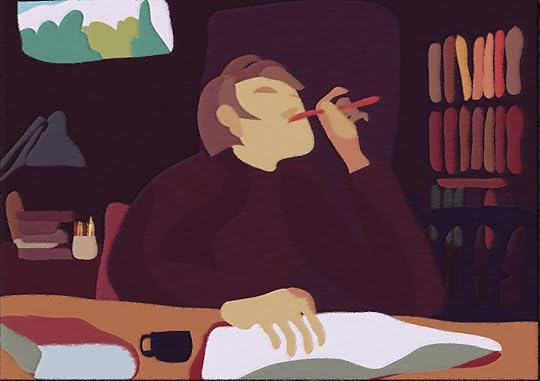 Photo credit: DailyPic on FlickrFrequently, around the interwebs, I see quotes that are meant to be inspirational for writers about how writers can’t do anything but write. Or how the true test of the writer is not not being able to write.
Photo credit: DailyPic on FlickrFrequently, around the interwebs, I see quotes that are meant to be inspirational for writers about how writers can’t do anything but write. Or how the true test of the writer is not not being able to write.There are also really flowery quotes about how wonderful writing is, and then you see media portrayals of the struggling—but brilliant!—writer who becomes a bestseller, and then you hear about a teen getting a publishing contract for about a bajillion dollars and the whole writing thing can sound like a pretty sweet deal.
These writers, man. They’re special. They feed on words and bathe in advances. They are living the dream.
And I mean, some of us are, I suppose. Some days I kind of am. But sometimes the dream staring at the screen for hours when you’re supposed to be writing and not actually writing a word, or looking at a mountain of revision notes and panicking about how you’ll ever manage it, or realizing you’re going to need way more than one book deal to even think about supporting yourself off your author wages, or not being able to write for months and starting to wonder if you’re really a writer after all. If you’ve lost your magic.
The truth is, I don’t like romanticizing the process because it doesn’t do anyone justice. Because if we pretend those hard days, weeks, months, years, even, didn’t happen then suddenly a writer’s success isn’t perceived as earned—it starts to look like it’s been given. Because if we pretend writing is something that comes naturally and can’t not be done then on the days where the writing is really hard, you might start to wonder if you’re really a writer at all.
I’m not into pretending writing is always amazing, and wonderful, and rainbows, and sugar. I’m not into ignoring the days where the writing is tough and I’m not sure what I’m doing and the pressure feels like almost too much. I’m not into overlooking the days where I’m exhausted from school but still have manuscripts to edit or vlogs to post or blog posts to write.
Don’t get me wrong, I love my pub jobs and I’m so grateful to be working in a field that I love. But I think being transparent about the realities of the publishing and writing life is important, both to encourage each other and to get through the not-so sunny days.
What do you think? Do you tire of the romanticization of writers?
Twitter-sized bites:
Writer @Ava_Jae says, "I’m not into pretending writing is always amazing..." What do you think? (Click to tweet)
On the romanticization of writers, and why one writer is tired of it. (Click to tweet)





Published on May 29, 2015 04:00
May 27, 2015
Fixing the First Page Feature #11
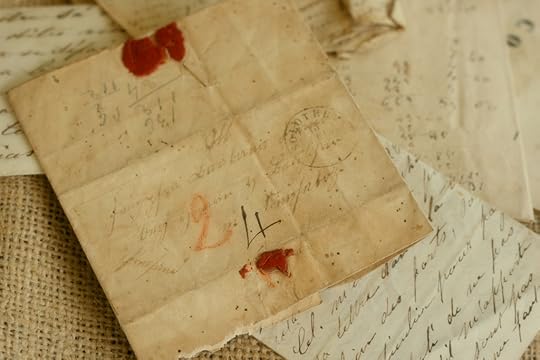 Photo credit: Bunches and Bits {Karina} on FlickrIt's time for the eleventh fixing the first page critique! Yay! As always, I'll start by posting the full first 250 excerpt, after which I'll share my overall thoughts, then my redline critique. I encourage you guys to share your own thoughts and critiques in the comments (I'm just one person with one opinion!), as long as it's polite, thoughtful, and constructive. Any rude or mean comments will be unceremoniously deleted.
Photo credit: Bunches and Bits {Karina} on FlickrIt's time for the eleventh fixing the first page critique! Yay! As always, I'll start by posting the full first 250 excerpt, after which I'll share my overall thoughts, then my redline critique. I encourage you guys to share your own thoughts and critiques in the comments (I'm just one person with one opinion!), as long as it's polite, thoughtful, and constructive. Any rude or mean comments will be unceremoniously deleted.Okay! Here we go.
Title: SPINSTER BRIDE
Genre/Category: YA Fantasy
First 250:
"I break the red seal engraved with a tree stump crest, unfold the stiff white paper, and squint at the contoured penmanship. The letter I received last week from the de Paula Barony communicated the death of my aunt’s husband and her impending arrival. I don’t hold much hope this message will relay better tidings.
Dear Baron de Souza,
It is with great pleasure that I invite you and your family to celebrate the wedding of my granddaughter Sophia de Paula to Lord Gavin Gwynn. The reception will be held at the riverside fortress of the de Paula Barony on the sixth day of the coming week.
Accommodations can be made for your party at the premises, and please forward my invitations to your baronets.
I hope this letter finds you in good health.
Looking forward to seeing you next week,
Baroness de Paula
I glance at the stack of letters on the large wooden desk then at the messenger who delivered them. His unruffled peasant garb is wrinkled from his day on the saddle.
'The others are for Father’s baronets?' I bite my tongue. My baronets.
He nods. 'Do I take back a reply?'
'Let Baroness de Paula know I’ll be attending with a small escort.' The other invitations I hand to Father’s Master of the Fields who is standing by my chair. I feel like I’m playing in Father’s dressing room, waiting for him to catch me in clothes too big for me. 'I’ll make sure these are delivered.'"
Okay, so, initial thoughts. I pretty immediately noticed two major things: first, the I double-checked the category because the voice does not sound YA to me (it sounds much more like adult), and second, I suspect this opening is starting too early.
On the first point, even for YA Fantasy which sometimes has slightly elevated language, the writing sounded too formal to me for YA (see phrases like "contoured penmanship," "communicated," "impending arrival," "I don't hold much hope" and "relay better tidings"). On their own, phrases like that could hypothetically work in YA without sounding too old, but all together in the first three sentences gives the impression written for an older audience, IMO.
On the second point, this, to me, just isn't an arresting enough opening. We don't know enough about the protagonist to really care what the letter says, and we don't know enough about what's going on to understand the significance of some likes like "My baronets." Furthermore, there isn't really any hint of conflict here—the protagonist is invited to a wedding and she agrees to go.
I'm wondering if it would be better to open when she arrives at the wedding (or just before/when conflict begins to happen at the wedding, which I presume is where the conflict begins). Either way, I think the solution here is to open closer to the inciting incident, whatever that may be, though of course I'm just guessing here based off the first 250. But on its own, this does not feel like a strong enough opening to me.
Now the in-line notes.
"I break the red seal engraved with a tree stump crest, unfold the stiff white paper, and squint at the contoured penmanship. The letter I received last week from the de Paula Barony communicated the death of my aunt’s husband and her impending arrival. I don’t hold much hope this message will relay better tidings. I already mentioned my thoughts about this first paragraph. As a whole, the writing is just fine and I like the details, but the language is a little wordy and in my opinion feels too formal for YA, even YA Fantasy.
Dear Baron de Souza,
It is with great pleasure that I invite you and your family to celebrate the wedding of my granddaughter Sophia de Paula to Lord Gavin Gwynn. The reception will be held at the riverside fortress of the de Paula Barony on the sixth day of the coming week.
Accommodations can be made for your party at the premises, and please forward my invitations to your baronets.
I hope this letter finds you in good health.
Looking forward to seeing you next week,
Baroness de Paula
Do we need to know every word of the letter? It seems to me like a pretty standard invitation and I find that it's slowing down the pacing in the opening. If you choose not to cut this scene entirely, you may want to consider cutting the letter and just making it clear that it's an invitation to a wedding. (An example where telling might actually work better than showing.)
I glance at the stack of letters on the large wooden desk then at the messenger who delivered them. His unruffled peasant garb is wrinkled from his day on the saddle. I have two problems with "peasant garb." First, it's not very descriptive and I'm not entirely sure what it means. What is "peasant garb" to the protagonist? Second, it makes the protagonist sound super snooty. I understand that she's from a high status family, but calling someone's clothes "peasant garb" makes me not like her very much.
'The others are for Father’s baronets?' I bite my tongue. My baronets. As stated above, I don't understand the significance of this line. Why does she bite her tongue? Why does this bother her?
He nods. 'Do I take back a reply?'
'Let Baroness de Paula know I’ll be attending with a small escort.' The other invitations I hand to Father’s Master of the Fields who is standing by my chair. I feel like I’m playing in Father’s dressing room, waiting for him to catch me in clothes too big for me. This is nice. I like that we see some of her insecurity here. It makes me a little more sympathetic toward her. 'I’ll make sure these are delivered.'"
On a writing level, I think this is actually written well (which is why I don't have many notes on the writing itself), just...not necessarily for YA as I mentioned above. I think in order for this to really read like YA we need to streamline some sentences and remove some of the more formal (and wordy) phrases. The idea is to write the way today's audience might imagine a teen would speak whenever this takes place—if she doesn't sound like a teen to the reader (not necessarily the way a teen would actually speak then), no amount of authenticity is going to matter.
Some good examples of YA Fantasy voices that do this include the TV show Reign (which say what you like about its lack of historical accuracy, does a good job capturing a YA (TV) voice in a historical setting) and the Graceling Realm series by Kristin Cashore.
With a re-worked opening closer to the inciting incident and with a hint of conflict, I think this could be really interesting. But unfortunately as is, if I saw it in the slush, I would probably pass.
I hope this helps! Thanks for sharing your first 250, Patchi!
Would you like to be featured in a Fixing the First Page Feature? Keep an eye out for the next giveaway!
Twitter-sized bite:
.@Ava_Jae talks starting in the right place & historical YA voices in the 11th Fixing the 1st Page critique. (Click to tweet)





Published on May 27, 2015 04:00
May 26, 2015
Vlog: How to Write When You Don't Want To
Confession: sometimes writers don't feel like writing. But here are some ways to work through the slump.
RELATED LINKS:
How Not to Get Overwhelmed with RevisionsHow to Edit in Passes
Have you ever experienced this slump? What did you do to get through it?
Twitter-sized bite:





RELATED LINKS:
How Not to Get Overwhelmed with RevisionsHow to Edit in Passes
Have you ever experienced this slump? What did you do to get through it?
Twitter-sized bite:
Don't feel like writing but know you should? @Ava_Jae vlogs about breaking through the "don't want to write" slump. (Click to tweet)





Published on May 26, 2015 04:58
May 25, 2015
How to Turn an Idea into a Plot
 Photo credit: faungg on Flickr
Note: Quick announcement! The winner of the Trish Doller prize package is Victoria Gender! Woot! Congratulations, Victoria! Now onto the post...
Photo credit: faungg on Flickr
Note: Quick announcement! The winner of the Trish Doller prize package is Victoria Gender! Woot! Congratulations, Victoria! Now onto the post...
So it was brought to my attention that I’ve written frighteningly little on brainstorming and my brainstorming process, and I suspect that’s probably because my process is fairly nebulous and can vary depending on the book.
That said, I’m going to try to explain the best I can anyway.
So you have some kind of idea. Maybe it’s just a character, or a single scene, or a vague compilation of images. For me, it almost always starts with a character (though Beyond the Red was a notable exception), usually the protagonist. But regardless of where you idea begins, when all you have is a fragment, it can seem kind of impossible to turn it into a whole book.
The very first thing I do when I have an idea fragment I want to explore is make a bulleted list. This list will include anything and everything I think of related to the idea: What If? scenarios, other characters, potential sources of conflict, possible scene ideas, setting notes, genre/category notes, themes I’m interested in exploring, etc. In this stage, I don’t filter at all—the idea is to just get as much down as possible.
Usually, by the time I get to the bottom of the list, I’ve started to get a feel for the potential book. That’s when I go back and start to weed things out by starring bullets I really like. Once I’ve got my main bullets marked out, potential plot ideas start (slowly) forming in my mind.
The very first plot point I tend to nail down is the inciting incident. Occasionally another random plot point will surface before the inciting incident, but once I have the inciting incident down, that’s when I open up Scrivener and start a new project.
Note that at this point, starting a new Scrivener project does not guarantee the book is going to be written. Or even fully plotted for that matter. All it means is I like where this idea is going enough that I want to explore it further. There’s no pressure whatsoever in this stage—I’m just testing the fragments I have to see if I can expand and weave it together into a potential book plot.
I’ve mentioned before that I am a plotter, and this is where the plotting really begins. I go straight to Scrivener’s cork board, write down the inciting incident and any other scene ideas I already have…then stare at it and try to push it further. I like to start from the inciting incident and think, okay, what could happen next? Some questions I frequently ask myself in this stage include:
What happens next? How can I make this worse? What if x happened?
While I do this, I try to keep the main points in mind. Generally the first couple points I want down are the big plot points (Inciting Incident, Point of No Return, Rising Action, Dark Night of the Soul, Climax, Falling Action, Ending) but it doesn’t always work out that way. The ending, especially, I often don’t figure out until I’ve plotted most of the book.
From there, there’s a lot of back and forth. I jump around between flash cards and add new scene ideas wherever I can think of them, writing a sentence to a paragraph on each card to describe the scene/plot point. I delete scenes, rewrite them and move them around until the plot makes sense and fits the way I want it to. Once I’ve hit roughly somewhere between 30-50 flash cards (depending on how long I sense the book will probably be) and I can’t think of anything else to add and it all flows together in a way that makes sense, I know I’m ready to start first drafting.
And maybe when I’m first drafting I’ll fall in love with the characters and the ideas and write the whole book. Or maybe I won’t. But either way, if the idea makes it to the end of the plotting stage (not all ideas do), then I know at the very least it’s worth experimenting with with some words.
How do you turn an idea into a plot?
Twitter-sized bite:
How do you expand a book idea into a whole plot? Writer @Ava_Jae explains her process. (Click to tweet)





Published on May 25, 2015 04:00

